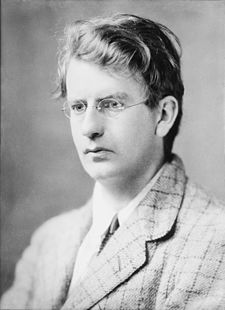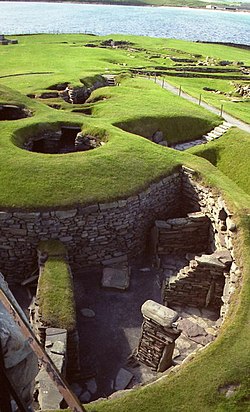Portal:Scotland
| Main Page | Selected articles 1 | Selected articles 2 | Selected biographies | Selected quotes | Selected pictures | Featured Content | Categories & Topics |
Introduction
 |

|
|

| ||
Scotland (Scots: Scotland; Scottish Gaelic: Alba) is a country that is part of the United Kingdom. It contains nearly one-third of the United Kingdom's land area, consisting of the northern part of the island of Great Britain and more than 790 adjacent islands, principally in the archipelagos of the Hebrides and the Northern Isles. To the south-east, Scotland has its only land border, which is 96 miles (154 km) long and shared with England; the country is surrounded by the Atlantic Ocean to the north and west, the North Sea to the north-east and east, and the Irish Sea to the south. The population in 2022 was 5,436,600 and accounts for 8% of the population of the UK. Edinburgh is the capital and Glasgow is the largest of the cities of Scotland.
The Kingdom of Scotland emerged in the 9th century. In 1603, James VI inherited the Kingdom of England and the Kingdom of Ireland, forming a personal union of the three kingdoms. On 1 May 1707 Scotland and England combined to create the new Kingdom of Great Britain, with the Parliament of Scotland subsumed into the Parliament of Great Britain. In 1999 a Scottish Parliament was re-established, and has devolved authority over many areas of domestic policy. The country has a distinct legal system, educational system, and religious history from the rest of the UK, which have all contributed to the continuation of Scottish culture and national identity. Scottish English and Scots are the most widely spoken languages in the country, existing on a dialect continuum with each other. Scottish Gaelic speakers can be found all over Scotland, however the language is largely spoken natively by communities within the Hebrides. The number of Gaelic speakers numbers less than 2% of the total population, though state-sponsored revitalisation attempts have led to a growing community of second language speakers.
The mainland of Scotland is broadly divided into three regions: the Highlands, a mountainous region in the north and north-west; the Lowlands, a flatter plain across the centre of the country; and the Southern Uplands, a hilly region along the southern border. The Highlands are the most mountainous region of the British Isles and contain its highest peak, Ben Nevis, at 4,413 feet (1,345 m). The region also contains many lakes, called lochs; the term is also applied to the many saltwater inlets along the country's deeply indented western coastline. The geography of the many islands is varied. Some, such as Mull and Skye, are noted for their mountainous terrain, while the likes of Tiree and Coll are much flatter. (Full article...)
Selected article

The Church of Scotland (Scots: The Kirk o Scotland; Scottish Gaelic: Eaglais na h-Alba) is a Presbyterian denomination of Christianity that holds the status of the national church in Scotland. It is one of the country's largest, having 259,200 members in 2023. While active membership in the church has declined significantly in recent decades (in 1982 it had nearly 920,000 members), the government Scottish Household Survey found that 20% of the Scottish population, or over one million people, identified the Church of Scotland as their religious identity in 2019. The Church of Scotland's governing system is presbyterian in its approach, therefore, no one individual or group within the church has more or less influence over church matters. There is no one person who acts as the head of faith, as the church believes that role is the "Lord God's". As a proper noun, the Kirk is an informal name for the Church of Scotland used in the media and by the church itself.
The Church of Scotland was principally shaped by John Knox, in the Reformation of 1560, when it split from the Catholic Church and established itself as a church in the Reformed tradition. The church belongs to the Presbyterian tradition of Reformed Christianity (Calvinism), having no head of faith or leadership group and believing that God invited the church's adherents to worship Jesus.
The Church of Scotland celebrates two sacraments, Baptism and the Lord's Supper, as well as five other ordinances, such as Confirmation and Matrimony. The church adheres to the Bible and the Westminster Confession of Faith, and is a member of the World Communion of Reformed Churches. The annual meeting of the church's general assembly is chaired by the Moderator of the General Assembly of the Church of Scotland. (Full article...) Read more ...
Selected quotes
" ... Preparing youngsters for failure is easy; it’s preparing them for success that’s really difficult ... "
" ... The battle for conservation will go on endlessly. It is part of the universal battle between right and wrong ... "
In the news

- 7 May 2024 – Premiership of John Swinney
- The Scottish Parliament votes to elect John Swinney as First Minister of Scotland with 64 votes in favour and seven abstentions from the Scottish Greens. (BBC News)
- 6 May 2024 – 2024 Scottish National Party leadership election
- John Swinney is elected leader of the Scottish National Party following the resignation of First Minister Humza Yousaf. (The Guardian)
- 4 May 2024 – International reactions to the Israel–Hamas war
- Palestinian doctor and rector at the University of Glasgow Ghassan Abu-Sittah is denied entry into France after landing at Charles de Gaulle airport on his way to speak at the French Senate. Last month, he was denied entry into Germany. (Al Jazeera)
- 1 May 2024 – 2024 Scottish government crisis
- The Scottish National Party administration survives the vote of no confidence earlier this week, prompting the party to seek a replacement for outgoing First Minister Humza Yousaf. (Al Jazeera)
- 29 April 2024 – 2024 Scottish government crisis
- Ahead of a planned vote of no confidence, Scottish First Minister Humza Yousaf announces that he will resign from office. (CNBC) (The New York Times)
- 25 April 2024 – 2024 Scottish government crisis
- Premiership of Humza Yousaf
Selected biography

John Logie Baird FRSE (/ˈloʊɡi bɛərd/; 13 August 1888 – 14 June 1946) was a Scottish inventor, electrical engineer, and innovator who demonstrated the world's first live working television system on 26 January 1926. He went on to invent the first publicly demonstrated colour television system and the first viable purely electronic colour television picture tube.
In 1928 the Baird Television Development Company achieved the first transatlantic television transmission. Baird's early technological successes and his role in the practical introduction of broadcast television for home entertainment have earned him a prominent place in television's history.
In 2006, Baird was named as one of the 10 greatest Scottish scientists in history, having been listed in the National Library of Scotland's 'Scottish Science Hall of Fame'. In 2015 he was inducted into the Scottish Engineering Hall of Fame. In 2017, IEEE unveiled a bronze street plaque at 22 Frith Street (Bar Italia), London, dedicated to Baird and the invention of television. In 2021, the Royal Mint unveiled a John Logie Baird 50p coin commemorating the 75th anniversary of his death.
Selected picture
Jarlshof is the best known prehistoric archaeological site in Shetland. It lies near the southern tip of the Shetland Mainland and has been described as "one of the most remarkable archaeological sites ever excavated in the British Isles".
Photo credit: Nigel Duncan
Did You Know...

- ... that the New York Yankees were first named after a Scottish regiment?
- ... that Ian Begg, known for his work on restoration of castles in Scotland, designed and built his own 20th-century tower house to live in?
- ... that Helen Steven shared the Gandhi International Peace Award for her opposition to the nuclear submarine base in Scotland?
- ... that Robert de Ogle captured five Scottish knights near Newcastle in 1341 and received royal licence to crenellate his property?
- ... that the Scottish medical missionary Ernest Muir championed the use of the traditional Ayurvedic cure chaulmoogra oil in treating Hansen's disease (leprosy)?
- ... that Scottish glass artist Denis Mann has made the winner's trophy for every series of the British game show Mastermind, which started in 1972?
- ... that the 2024 Hillhead by-election was the first by-election won by the Scottish Green Party?
- ... that the 1830 abandonment of Chipewyan woman Matooskie by her Scottish husband was eventually settled with a dowry payment of £200?
Get involved
For editor resources and to collaborate with other editors on improving Wikipedia's Scotland-related articles, see WikiProject Scotland.
To get involved in helping to improve Wikipedia's Scotland related content, please consider doing some of the following tasks or joining one or more of the associated Wikiprojects:
- Visit the Scottish Wikipedians' notice board and help to write new Scotland-related articles, and expand and improve existing ones.
- Visit Wikipedia:WikiProject Scotland/Assessment, and help out by assessing unrated Scottish articles.
- Add the Project Banner to Scottish articles around Wikipedia.
- Participate in WikiProject Scotland's Peer Review, including responding to PR requests and nominating Scottish articles.
- Help nominate and select new content for the Scotland portal.
Do you have a question about The Scotland Portal that you can't find the answer to?
Post a question on the Talk Page or consider asking it at the Wikipedia reference desk.
Related portals
Other language versions
Associated Wikimedia
The following Wikimedia Foundation sister projects provide more on this subject:
-
Commons
Free media repository -
Wikibooks
Free textbooks and manuals -
Wikidata
Free knowledge base -
Wikinews
Free-content news -
Wikiquote
Collection of quotations -
Wikisource
Free-content library -
Wikispecies
Directory of species -
Wikiversity
Free learning tools -
Wikivoyage
Free travel guide -
Wiktionary
Dictionary and thesaurus







































